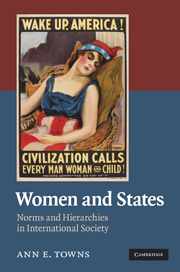Book contents
- Frontmatter
- Contents
- Tables
- Acknowledgments
- 1 Introduction
- 2 Constructivism and worldwide changes in state policy
- 3 A complex society of norms and social hierarchies
- 4 Excluding women in the society of civilized states
- 5 Women’s suffrage and the standards of civilization
- 6 National women’s policy bureaus and the standards of development
- 7 Legislature sex quotas and cultural rank
- 8 Conclusion
- Primary sources, by chapter
- Bibliography
- Index
5 - Women’s suffrage and the standards of civilization
Published online by Cambridge University Press: 05 October 2013
- Frontmatter
- Contents
- Tables
- Acknowledgments
- 1 Introduction
- 2 Constructivism and worldwide changes in state policy
- 3 A complex society of norms and social hierarchies
- 4 Excluding women in the society of civilized states
- 5 Women’s suffrage and the standards of civilization
- 6 National women’s policy bureaus and the standards of development
- 7 Legislature sex quotas and cultural rank
- 8 Conclusion
- Primary sources, by chapter
- Bibliography
- Index
Summary
In the , we saw that prohibiting women from state office and political activity became a standard of behavior among states in the nineteenth and early twentieth centuries. Whereas the ability of women to be part of formal state affairs had previously varied considerably across Europe, uniform expectations developed and barring women became standard policy. We also saw how such prohibitions became linked with European civilization and turned into a standard expressly for societies that had moved away from the so-called savage stage. Keeping women out of the formal political sphere had become a norm for civilized states.
In this context, one of the first book-length historical analyses of the then contemporary woman’s rights movement stated that “woman’s suffrage is the most radical demand made by organized women, and is hence advocated in all countries by the ‘radical’ woman’s rights advocates.” Claiming suffrage to be radical was no exaggeration at a time when only four countries had granted women the right to vote. This was about to change. In the coming century, almost every state introduced women’s suffrage, making the measure global in scope and hardly extreme. In fact, to most, radicalism today is found in the extremely rare denial of women’s suffrage, such as in the case of Saudi Arabia.
- Type
- Chapter
- Information
- Women and StatesNorms and Hierarchies in International Society, pp. 81 - 121Publisher: Cambridge University PressPrint publication year: 2010



